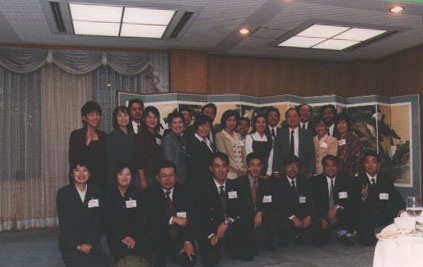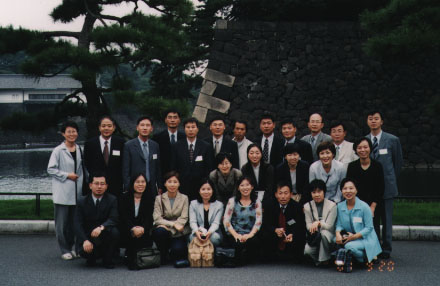On October 16, the day after Japanese Prime Minister Junichiro Koizumi made a controversial and short trip to Seoul, a group of 24 Japanese secondary school teachers visited Korea for a 15-day study tour at the invitation of the Korea Foundation. As part of the Second Korea-Japan Educational Exchange Program co-sponsored by the Foundation and the Japan Foundation, 24 Korean teachers traveled to Japan from September 19 to October 3.
The exchange program, which was launched in 2000 in commemoration of both Korea and Japan winning the right to co-host the 2002 World Cup Finals, featured the participation of educators from each of the ten Korean and Japanese cities that are set to co-host the final rounds of the World Cup. As such, the program aims to help educators in both countries to broaden their and their students' understanding of each country. Initially, many people were concerned that the program might be called off due to the rising tension in Korea-Japan relations following the recent textbook controversy in Japan, in which the Ministry of Education approved a revisionist middle school history textbook that allegedly distorted Japan's wartime and colonial era legacy. In the end, however, both sides agreed to push ahead with the program in the belief that private sector exchanges between the two countries should be strengthened regardless of developments in official diplomatic relations. I think these efforts yielded more and better results than expected.
The two-week program included various lectures and activities on Korean culture designed to provide an appreciation and understanding of things Korean. In particular, I think the lecture by Seoul National University Prof. Kim Yong-Deok on "Seeking an Ideal Relationship between Korea and Japan" provided the Japanese schoolteachers with a fresh perspective on Korea. I also think that they acquired good firsthand experience on Korea through their tours of various historical sites and a number of unscheduled activities. It was particularly useful for them to exchange views with a number of Korean teachers who had visited different parts of Japan.
Korea and Japan have often been described as diplomatically "close but remote," since both have been consistently unable to thrash out their differences on a host of historical issues. Nonetheless, I am confident that Koreans and Japanese can become closer if they open their hearts to each other. As is the case with individual relationships, I think that countries can develop better relations if they stop blaming each other for what goes wrong and instead reflect both on their own behavior and on the possibilities of the future.
 |
Welcoming reception for Japanese secondary
teachers on a 15-day study tour of Korea. |
During the visit, one Korean teacher, who had been touched by the Japanese hospitality he experienced during his own visit to Japan, volunteered to serve as a guide for the visiting Japanese group. In turn, the Japanese teachers, moved by this teacher's kindness, promised to return the favor the next time Korean teachers visited Japan.
Although this exchange program failed to draw much media publicity, it is hoped that the Korea and Japanese teachers who participated will work to foster better relations between the two countries through their students and colleagues. Through such personal efforts it is hoped that Korea and Japan will forge a healthy and forward-looking relationship.
The Following are the personal thoughts of two participants in the 2001 Korea-Japan Educational Exchange Program. ―ed.Warm-hearted Japanese FriendsNo Sung Tae
History Teacher, Kukje High School, Gwangju City
(histonoh@hanmail.net)The 15 days I spent in Japan seemed like a long time, but on reflection it was really too short. All the things I experienced in Japan are still vivid in my mind. These include the lectures on Japan's educational reforms and modernization effort, the Tokyo National Museum, Nara National Museum, Todaiji Temple, Horyuji Temple, Hiroshima Peace Park, Hokkaido Nishi High School, and especially the family of Mr. Yoshimine. I can also still remember the taste of delicious momiji dumplings, okononomiyaki pancakes, Sapporo ramen noodles, and Asakusa mochi rice cake. However, it is the memory of the warm-hearted Japanese whom I met that I hold most dear.
On my flight back to Korea, I had lunch on the plane after eating breakfast in Tokyo. By the end of the day, I was eating dinner back in Gwangju. Yet Japan remained very close to me.
It takes only two hours to fly from Tokyo to Seoul, and just another two hours to drive from the airport at Daejeon to my home in Gwangju. Yet Japan often seems to me to be far away. Indeed, Japan is often completely out of most Koreans' daily thoughts.
It thus came as something of a surprise to find that the educational problems and reform efforts that we saw in Japan were very similar to our own. Korea and Japan have long been close neighbors, and have carried out cultural exchanges for literally thousands of years. Yet recently, Korea and Japan have not been real neighbors, despite their geographical proximity.
If "seeing is believing," then the 15 days I spent in Japan were indeed very enlightening. My visit enabled me to realize first that many of the Japanese I met had absolutely no militarist view of history. Indeed, to a person all were warm-hearted individuals with great respect for Korea, and some even shed tears when it was time for us to leave. Without a doubt, the Japanese I met were nice, ordinary people with common sense and a passion for their work.As culture is increasingly replacing ideology as an international focal point, some countries and groups of countries are beginning to emerge as world centers. Europe is clearly reemerging as a major world center, and China is quickly emerging to challenge the global economic order currently dominated by the United States. With such developments in mind, it seems natural that Korea and Japan should gravitate toward each other as natural allies in an uncertain world.
 |
Korean teachers visit Nijojo Castle
in Kyoto, Japan. |
In many ways, the 21st century is emerging as an information age where culture is destined to play an increasingly important role. Koreans for their part certainly no longer think that Korea is culturally superior to Japan simply because the country was once a source of cultural enrichment for generations of Japanese. At the same time, Koreans are beginning to put the legacy of Japan? colonial rule over Korea in the past. Indeed, rather than reminiscing about past cultural supremacy or remembering the pain we experienced at the hands of Japan's militarists, Koreans should forgive Japan and make peace as new friends by genuinely respecting each other. By doing so, both countries can ensure a better future and derive strength from the education and creativity of their peoples.
My recent trip to Japan has led me to believe that the peoples of both countries can become genuinely close friends. My trip was a memorable and valuable experience, and it reminded me that from space, the earth has no borders. The Japanese I met were kind and considerate, and upon leaving Narita Airport I felt an emotional parting from what I now see as a real friend: Japan.
Korea: A Close and Kind NeighborShimizu Norikazu
History Teacher, Iruma High School, Saitama Prefecture
It is no secret that for too long Korea and Japan suffered from a lack of mutual understanding for each other's history and culture despite their geographical proximity. Most of the 24 Japanese teachers on this exchange were visiting Korea for the first time, even though they had all previously traveled to other countries. This is not uncommon in Japan. Few Japanese put Korea on the top of their list of desired foreign destinations, and since most Japanese are unfamiliar with Korean history and culture, they tend to see Korea as "close but remote."
Part of this problem has to be laid at the feet of each country's educators. Over the years I have taught my students about Korea but only recently during my recent trip did I realize that I have lacked a genuine understanding of Korean history, Korean culture, and Korean-Japanese relations.
Three things struck me most during my trip to Korea. First, I was impressed by Professor Kim Yong-Deok's keynote speech to our group. While he rebuked Japan as "a pleasure-seeking country," he urged Japan to become "a model advanced nation that loves peace."
Second, our tour of the truce village of Panmunjeom along the demilitarized zone between North and South Korea offered me a better understanding of the legacy of the Korean War, the division of the country, the current inter-Korean situation, modern Korea-Japan relations, and even life in North Korea. It was also a valuable opportunity to think over the value and importance of peace.
Finally, our trip provided us with a memorable trip to Buyeo, Gyeongju, and other important historical sites. I was particularly impressed by the rich and outstanding cultural legacy of Gyeongju.The weather in Korea was also friendly to us, and we all enjoyed the country's beautiful autumn scenery. Although our visit lasted just two weeks, it was a valuable opportunity for us to view a variety of interesting sights with the sincerity and cooperation of the Korea Foundation's Personnel Exchange Team. I am certain that all of the Japanese teachers on this trip tried hard to see what could not be seen and hear what could not be heard during our tour. All of us will certainly convey the lessons of this tour to our students and colleagues so as to help the youth of both Korea and Japan enhance their mutual understanding of each country. I hope that in the future Korea and Japan become "close and neighborly" rather than "close but remote."
 한국국제교류재단
한국국제교류재단 newsletter
newsletter











